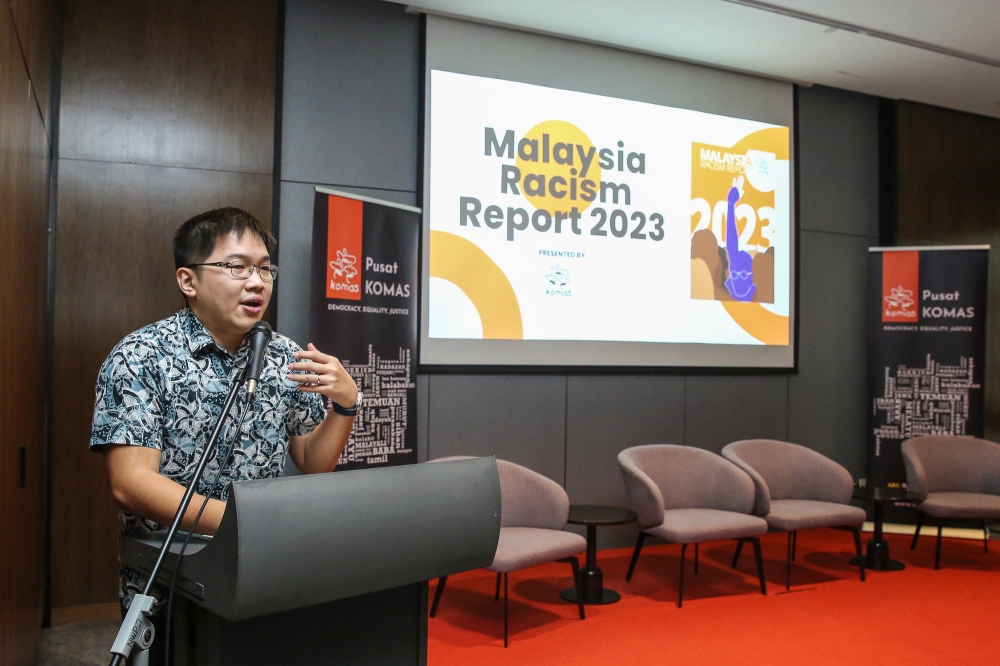KUALA LUMPUR, March 15 — Malaysia’s reluctance to ratify the International Convention on the Elimination of All Forms of Racial Discrimination (ICERD) doesn’t bode well for the country’s battle against racism.
Pusat Komas in its annual Racism Report today said Malaysia was one of the last nations in the world to ratify ICERD when even other Muslim countries have already done so and delaying it only shows the government’s lack of intent in combating the rising racism in Malaysia.
“We are part of the last 14 countries that have not ratified, and I’ll read the countries out so we can reflect on this. We are in the fiend circle of Brunei, Myanmar, North Korea, South Sudan and the rest are small Pacific Island nations: Cook Islands, Vanuatu, Micronesia, Kiribati, Samoa and Tuvalu.
“Pacific islands have very little capacity to make ratifications, that’s a different discussion altogether. In the OIC (Organisation of Islamic Countries) we remain the only two countries who have not ratified ICERD, Brunei and Malaysia,” said Komas board member Jerald Joseph.
“So all the justification not to join the global move is strange when the Madani government’s framework is one of inclusivity and leaving no one behind; hence, this is something for us to reflect on,” he said during the launch of the report today.
ICERD is contained in the Pakatan Harapan (PH) manifesto and was mentioned by then prime minister Tun Dr Mahathir Mohamad at the United Nations (UN) conference in 2018.
On November 23, 2018, the PH government decided against acceding to ICERD after weeks of racially and religiously charged protests. ICERD was initiated by the United Nations (UN) in 1965 to deal with global racial intolerance, but in Malaysia, it was perceived as a threat to Bumiputera special privileges (Article 153) and Islam.
Komas said that ratifying ICERD would be one of the ways to battle racism in Malaysia which the report said was not being checked.
It said that reported cases of racism dropped from 82 in 2022 to 50 in 2023 but this was only because 2022 was an election year. Many politicians had been using race and religion to further their ambition and to garner votes.
From the 50 reports, race and religion politics constituted the highest number of cases at 31.4 per cent. expressions of prejudice, provocation and incitement (17.6 per cent), discrimination in the education sector 9.8 per cent, sports (7.8 per cent), racist or discriminatory policies (7.8 per cent), Xenophobia (11.8 per cent) and racial discrimination in other sectors (13.7 per cent).
“Fear mongering is a strategy used by politicians by making false statements and creating false narratives against thee opposing party by claiming victory could be disastrous o the community their serving,” said Ryan Chua, Komas programme director.

“It is also difficult when politicians continue to see Malaysia as a “Malay first” country and the Malays being the rightful owners of the land. This highlights the Malaysian struggles but invalidates the contributions and struggles of the non-Malay community,” he added.
Chua gave the example of Bersatu MP Wan Ahmad Fayshal Wan Ahmad Kamal challenging Prime Minister Datuk Seri Anwar Ibrahim to use his two-thirds majority in the Dewan Rakyat to amend the Federal Constitution to ensure that only Malays can become the prime minister.
The other example was when PKR’s Najwan Halimi made a racial slur against Parti Sosialis Malaysia’s Indian candidate Sivaranjani Manickam. Najwan had called her and her party “Party India Estet” meaning an Indian party from the estates.
“This incident is racist in nature, and it degrades the Indian race by equating them to estate as people or classes of poverty,” said Ryan.
“Stereotyping is harmful in daily life, what more when it comes to politics,” he added.



















